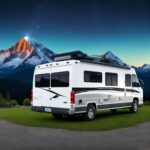Are you tired of sweltering in the summer heat or freezing during chilly nights in your RV? It’s time to find the perfect generator to keep your RV’s HVAC system running smoothly. In this comprehensive guide, I’m going to help you choose the right generator so you can stay comfortable no matter where you roam.
Understanding Your RV’s Power Needs
1. Calculate Your Power Requirements
Start by listing all the appliances and devices you intend to power simultaneously in your RV. Don’t forget the HVAC system, lighting, kitchen appliances, and electronics. Add up their wattage to determine your total power needs.
2. Consider Start-Up Surge
Some appliances, like air conditioners, have a higher start-up wattage (surge wattage) than their running wattage. Your generator should be able to handle these surges without overloading.
3. Determine Fuel Type
Generators can run on various fuels, including gasoline, propane, or diesel. Consider your fuel preferences and availability when choosing a generator.
Types of Generators
1. Portable Generators
Pros: Affordable, versatile, easy to store
Cons: May require manual start, limited power output
2. Inverter Generators
Pros: Quiet, fuel-efficient, stable power
Cons: Costlier upfront, limited wattage for larger RVs
3. RV Generators
Pros: Designed for RVs, convenient, can power entire RV
Cons: Expensive, may require professional installation
Sizing Your Generator
1. Match the Wattage
Choose a generator with a rated wattage that matches or slightly exceeds your calculated power needs. This ensures you have enough power for all your appliances.
2. Consider Parallel Capability
If your power needs are substantial, some generators allow you to connect two in parallel for extra power.
FAQ : Don’t Sweat It: Picking the Right Generator for Your RV
1. Can I run my RV’s HVAC system on solar power alone?
- While solar can assist in charging your RV’s batteries, it’s typically not sufficient to run the HVAC system alone for extended periods, especially during high-demand situations.
2. What’s the difference between a generator’s running watts and surge watts?
- Running watts refer to the continuous power a generator can provide. Surge watts represent the temporary increase in power needed when appliances start up.
3. How can I reduce my generator’s noise level?
- Invest in an inverter generator, use a generator muffler, and place the generator on a noise-reducing base or enclosure.
4. Should I choose a dual-fuel generator for versatility?
- Dual-fuel generators can run on both gasoline and propane, offering versatility and extended runtimes. They’re a great choice if you have access to both fuel types.
5. Can I install an RV generator myself?
- It’s possible for experienced DIYers, but for safety and warranty reasons, professional installation is recommended, especially for larger RV generators.
6. Is it safe to run a generator inside an RV?
- No, running a generator inside an RV can lead to carbon monoxide poisoning. Always place the generator outdoors in a well-ventilated area, away from living spaces.
With these tips and FAQs in mind, you’re well-equipped to select the right generator for your RV’s HVAC needs. Don’t sweat it; stay comfortable on your RV adventures, no matter the weather! 🚐❄️☀️
- Transform Your Health with Medford Medical Weight Loss Program - June 9, 2025
- A Chat with Nate and Mika, Christian Wedding Photographers - July 18, 2024
- Ultimate Guide To Playing Online Casinos - May 27, 2024









